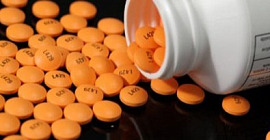 Experts recommend that older women have regular bone density tests to screen for osteoporosis. But it's been unclear how often to repeat the tests. A study of nearly 5,000 women now reports that patients with healthy bone density on their first test might safely wait 15 years before getting rescreened.
Experts recommend that older women have regular bone density tests to screen for osteoporosis. But it's been unclear how often to repeat the tests. A study of nearly 5,000 women now reports that patients with healthy bone density on their first test might safely wait 15 years before getting rescreened.
Osteoporosis is a disorder marked by weakened bones and an increased risk of fractures. More than 40 million people nationwide either have osteoporosis or are at increased risk for broken bones because of low bone mineral density (osteopenia).
Osteoporosis is often called a “silent disease” because it usually progresses slowly and without symptoms until a fracture occurs. en low bone density is identified early through screening, lifestyle changes and therapies can help protect bone health and reduce the risk of fractures. That's why the U. S. Preventive Services Task Force recommends routine screening of bone mineral density for women ages 65 and older.
To help doctors decide how often to repeat bone density tests in women who don't have osteoporosis at their initial screening, a research team led by Dr. Margaret Gourlay of the University of North Carolina at Chapel Hill analyzed data on nearly 5,000 women, age 67 or older. The women were participants in the Study of Osteoporotic Fractures, a long-term nationwide study supported by NIH’s National Institute of Arthritis and Musculoskeletal and Skin Diseases (NIAMS), National Institute on Aging (NIA) and National Center for Research Resources (NCRR).
Researchers divided the women divided into 4 groups based on initial bone density tests that were either normal or showed mild, moderate or advanced osteopenia. They were given 2 to 5 bone density tests at varying intervals during the 15-year study period.
Get The Latest By Email
the scientists found that less than 1% of women who initially had normal bone mineral density went on to develop osteoporosis during the study. Only 5% of those with mildly low bone density at the start made the transition to osteoporosis. Overall, the data suggest that women in these 2 categories might safely wait about 15 years before being rescreened for osteoporosis.
The scientists also found that about 1 in 10 women with moderate osteopenia at baseline developed osteoporosis within 5 years. For those with advanced osteopenia at the start, about 10% had developed osteoporosis within a year, suggesting that 1-year screening intervals might be advisable for this group.
If a woman's bone density at age 67 is very good, then she doesn't need to be rescreened in 2 years or 3 years, because we're not likely to see much change,” Gourlay says. Our study found it would take about 15 years for 10% of women in the highest bone density ranges to develop osteoporosis. That was longer than we expected, and it's great news for this group of women.
These findings can help guide doctors in their bone screening recommendations. Other risk factors, such age, medications or specific diseases, would also influence screening frequency.
http://www. niams. nih. gov/Health_Info/Bone/Osteoporosis/default.
http://www. nia. nih.
http://www. niams. nih. bone_mass_measure.
http://newsinhealth. nih. gov/2010/February/feature1.
Article Source:
http://www.nih.gov/researchmatters/january2012/01302012bone.htm










